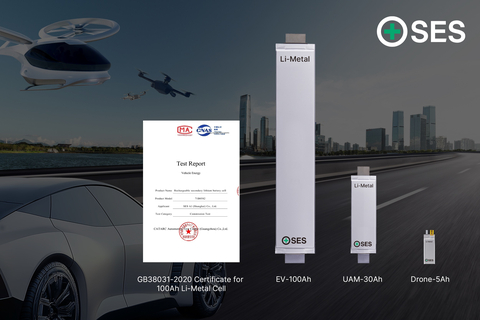SES AI Corporation (NYSE: SES), a U.S. Li-Metal batteries manufacturer, announced on August 12th that its 100 Ah Li-Metal batteries for electric vehicles have passed the safety test of China's GB 38031-2020 "Safety Requirements for Power Batteries Used in Electric Vehicles." This marks the first 100Ah automotive-grade lithium metal battery cell to pass the national standard test for electric vehicle power batteries, further advancing the commercialization of the next-generation battery technology.
SES's First 100 Ah Li-Metal batteries for Electric Vehicles and Drone Markets
GB38031-2020 is one of the first mandatory national standards in China's electric vehicle sector. As the world's largest electric vehicle market, the battery safety standards set by China in GB38031-2020 are also widely recognized by SES and its OEM partners, as well as many other global car manufacturers.
GB38031-2020 is specifically designed for the electric vehicle industry, covering a series of rigorous abuse tests such as overcharging, over-discharging, external short circuits, heating, temperature cycling, and crushing. Passing the GB38031-2020 test indicates that SES AI's 100 Ah Li-Metal batteries can effectively manage safety risks under these stringent test conditions. This follows SES AI's acquisition of the UN38.3 safety certificate for the transportation of dangerous goods last year, marking another significant certification in its battery safety performance.
Hu Qichao, founder and CEO of SES AI, stated that lithium metal batteries for electric vehicles (EVs) and urban air mobility (UAM) need to pass two types of safety tests: abuse and in-use. For abuse tests, GB38031-2020 is a key industry standard, and this is also the first Li-Metal batteries in the industry to pass the rigorous safety test of GB38031-2020. In terms of safety in use, SES's AI for Safety can predict and prevent almost 100% on-site accidents. Combining the GB38031-2020 test with AI for Manufacturing for in-use is an important milestone toward the commercialization of Li-Metal for EV and UAM applications.
In addition to electric vehicles, this 100 Ah lithium metal cell can also be applied to drones and other urban air mobility (UAM) fields. On the same day of August 12th, the company also announced that the Li-Metal batteries production facility dedicated to urban air mobility (UAM), built in Chungju, South Korea, has also completed the conversion and Field Acceptance Test (FAT). This shows that the company's Li-Metal batteries in the field of electric aviation are also rapidly advancing the commercialization process.
SES AI announced its strategic entry into the low-altitude economy field of urban air mobility (UAM) in December last year. Currently, SES AI has the world's first production line dedicated to urban air mobility (UAM) in South Korea. In April of this year, SES AI signed a B-sample joint development agreement (JDA) with Hyundai Motor Company and Kia Corporation, making it the only Li-Metal batteries company with B-sample agreements from two OEMs.
At the recent second-quarter shareholder meeting, the company also announced an All-in-on-AI strategy, using artificial intelligence in the application of science, manufacturing, and safety to accelerate the commercialization of Li-Metal batteries in electric vehicles and aerial electric transportation such as Urban Air Mobility (UAM) and drones.
SES's All-in-on-AI Strategy
Founded in 2012, SES AI is a developer and manufacturer of Li-Metal batteries headquartered in Boston, with offices in Singapore, Shanghai, and Seoul.







